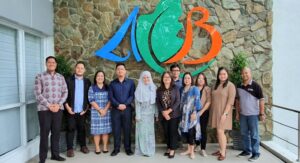A historic partnership for climate and biodiversity. (L-R) Dr. Faye Cruz, Head of the Regional Climate Systems Laboratory, Manila Observatory; Fr. Jose Ramon Villarin, SJ, Executive Director of Manila Observatory; DENR Secretary Maria Antonia Yulo-Loyzaga; Dr. Theresa Mundita Lim, Executive Director of the ASEAN Centre for Biodiversity (ACB); and Dr. Arvin Diesmos, ACB Director of Biodiversity Knowledge Management Department during the MoU signing between ACB and MO.
QUEZON CITY, Philippines – The ASEAN Centre for Biodiversity (ACB) and the Manila Observatory (MO) formalised their partnership through a signing of a Memorandum of Understanding (MoU) and a media forum on biodiversity and climate change on 2 October 2023 at the Manila Observatory in Ateneo de Manila University.
This initiative will enhance climate and biodiversity synergy that will generate useful information relevant to public and private institutions, as well as to the communities directly affected by climate change. The ACB and MO will develop projections through modelling of different climate scenarios on biodiversity and its ecosystems. This will provide scientific data on how healthy or well-managed environments can mitigate adverse climate impacts such as threats in food security, human health, and public safety. Knowledge exchange, harmonising efforts of similar initiatives from other institutions, and capacity building are also part of the objectives of this pioneering partnership.
This partnership launch also commemorates the MO’s 158th founding anniversary. “The Manila Observatory has had a longstanding tradition in the atmospheric and earth sciences for 158 years now and is presently training its sights on fine-scale climate change, air quality, environmental instrumentation, geographic information and remote sensing systems. We look forward to working with the ASEAN Centre for Biodiversity to uncover the vital connections between biodiversity and climate, which can only increase our resilience in the face of climate challenges ahead of us,” said Fr. Jose Ramon T. Villarin, S.J., Executive Director of the Manila Observatory.
Meanwhile, Dr. Theresa Mundita S. Lim expressed enthusiasm for the partnership and explained that the initiative will highlight how biodiversity is one of the most effective nature-based solutions to the detrimental impacts of a warming planet. “Biodiversity, through protection, ecosystem restoration, and conservation, are nature-based solutions that are a crucial part of climate action. The diversity of ecosystems found in the ASEAN all serve as various layers of protection against climate change impacts,” she said.
The ASEAN Climate and Biodiversity Initiative
This partnership will be called ASEAN Climate and Biodiversity Initiative, which will serve as a platform whereby scientists, particularly climate and biodiversity experts, researchers, and communicators will actively engage and share scientific information to elucidate the connectivity between biodiversity and climate change, while highlighting the role of biodiversity as a nature-based solution to the climate crisis.
This initiative will be piloted in selected areas in the Philippines and will then be scaled up to cover other critical areas in the ASEAN Member States. This will create a strong network of climate and biodiversity experts in ASEAN to further establish linkages with other agencies developing similar initiatives.
Leveraging its strong collaboration and engagement with the Coordinated Regional Climate Downscaling Experiment – Southeast Asia (CORDEX-SEA), the MO will focus on generating necessary climate information for impact studies on biodiversity. CORDEX-SEA climate data overlaid with biodiversity data will be analysed to elucidate the sensitivity of ecosystems and priority species to the changing climate.
Meanwhile, the ACB will facilitate dialogues and information exchange and propose collaborative actions, to contribute to the achievement of relevant targets under the Kunming-Montreal Global Biodiversity Framework and UN Sustainable Development Goals.

DENR Secretary Loyzaga poses with the ACB and MO officials, media representatives, and science communicators.
About the ASEAN Centre for Biodiversity
The ASEAN Centre for Biodiversity (ACB), established in 2005, is ASEAN’s response to the challenge of biodiversity loss. It is an intergovernmental organisation that facilitates cooperation and coordination among the 10 ASEAN Member States and with regional and international organisations on the conservation and sustainable use of biological diversity, and the fair and equitable sharing of benefits arising from the use of such natural treasures. To know more about the ACB, log on to www.aseanbiodiversity.org.
About the Manila Observatory
Established in 1865, the Manila Observatory (MO) is a leading scientific research institution engaged in the atmospheric and earth sciences in the Philippines. Using dynamical models, observational and data science, remote sensing and geographic information technologies, and lobbying for climate policy interventions, MO’s mission is to do science that empowers communities, especially the more vulnerable, to be adaptive and resilient in the face of development challenges arising from climate change. For more information about MO, please visit www.observatory.ph.
























